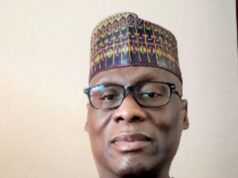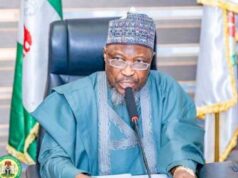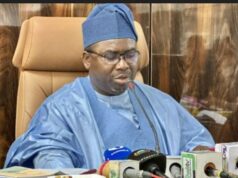
Fellow Nigerians, miracles shall never end. That is the only way to describe the incredible story of Major General Muhammadu Buhari at this auspicious moment. No one could have envisaged or foretold the huge drama being enacted before our very eyes. It was not as if his popularity and cult-followership was ever in doubt but the general belief and assumption was that it was dominantly limited and restricted to a particular section or region of Nigeria. What was never expected was a cross-over appeal to all areas and segments of our nation.
Buhari’s fate as a perennial contestant was supposed to have been sealed by many debilitating factors. The first and most crucial till this day is on account of his odoriferous reputation as a coup plotter and rabidly draconian dictator who appeared mercilessly vengeful. Depending on whom you talked to in the past, Buhari conjured different images to varied people. Some saw him as an Angel who represented a sword of Damocles to the wicked and reckless politicians who wreaked havoc on Nigeria’s economy and wrecked the collective future of our citizens. But to others, he was a Luciferous character who must have escaped from the pit of hell to haunt God’s creatures on planet earth.
I will not attempt to bore you with well-rehashed tales of his cardinal sins, both real and imagined. They are in the realm of fables and mythology and already in public domain courtesy of his opponents and unrelenting attackers. But one can never gloss over the allegations of religious bias and intolerance. If possible, many would want us to see and hold Buhari as Nigeria’s version of Osama bin Laden who was regarded as the world’s most notorious terrorist. Buhari would forever bear the cross of ever defending his personal faith and the interests of his Northern people like most of us would normally do. Many quotable quotes have been ascribed to him but most have never been properly validated by his accusers thus casting doubts on the veracity of those vituperations.
The last but not the least albatross against Buhari is the matter of old age. I must confess that I belong in the category of the vociferous proponents of sacking most of our ancient leaders and replacing them with young and vibrant whizzkids.
I must sincerely thank the media and publicity committee of the People’s Democratic Party for finding my past comments and stance on Buhari so important and worthy of sponsored countervailing advertorials in several newspapers and social media platforms. They were generous enough to put me in good company by attaching me to accomplished Nigerians such as Asiwaju Bola Ahmed Tinubu and Mallam Nasir El Rufai. On a serious note, it was such a great honour seeing all manner of caricatures about me including the one stuffing my brains with noodles.
The truth is that I, like many other Nigerians, was a veritable victim of the almost unprecedented propaganda against Buhari. In my purview, the definition of propaganda is not about telling lies but an attempt to magnify non-fiction until it becomes what the famous author Kole Omotoso called “faction”, when you mix facts with fiction. The demonization of Buhari was therefore a fait accompli emanating from the many years of ferocious regurgitation of his supposed misdemeanours. But, still, I would never have imagined that a day would come when I, and so many former antagonists of Buhari, would not only change my mind about this walking firebrand but actually plunge myself fully into his presidential campaign while not being a member of his political party. Strange are the ways of God indeed.
In my nearly 55 years on earth, this is the second time I would witness a complete transfiguration of a Nigerian from being most hated to most loved. My first recollection was in 1988 as I searched frantically for a job. My dream then had been to get a teaching appointment after concluding a Master’s degree in Literature-in-English at the great Obafemi Awolowo University, Ile-Ife. I was already contributing articles on the opinion pages of The Guardian which was edited by Odia Ofeimun and The Sunday Tribune, edited by Folu Olamiti. I was then subsequently invited by my friend, Onukaba Adinoyi-Ojo, a prodigiously gifted journalist, to try my luck in Lagos. He tried to get me a job at the African Guardian, edited by Nduka Irabor, but wasn’t successful.
Onukaba then suggested that I should try the African Concord magazine, owned by Chief Moshood Abiola and edited by Lewis Obi but I was most reluctant. Just imagine that though I was desperately in need of a job, but I was not very keen about working in the Concord Group. You, like me, will laugh at my reasons now. I was discouraged by so many things I had read or heard about the fabulously wealthy ‘Money Kudi Owo’ Abiola, who was supposed to have been the biggest thief in Africa, courtesy of Fela’s album, ITT, International Thief Thief. That song had done incalculable damage to Chief Abiola as many self-righteous people, including myself, completely tuned off the man.
I remember very vividly how there was a war of words between the Awoists (who believed the support of Chief Abiola, a Yoruba, for the National Party of Nigeria was partly responsioble for robbing Chief Obafemi Awolowo of victory against Alhaji Shehu Shagari who won the Presidential election in 1979) and the Abiola supporters who felt there was nothing wrong in Yorubas belonging to opposing parties. The Nigerian Tribune had fiery writers led by Chief Olabisi Onabanjo, Ebenezer Babatope (aka Ebino Topsy) while The Concord Group assembled some of Nigeria’s finest journalists including Doyin Abiola, Dele Giwa, Ray Ekpu, Yakubu Muhammed, Duro Onabule, Sina Adedipe and so many others. The columnists of both rival papers tackled themselves endless and joined issues on various national and personal matters. Of particular interest to me was a columnist popularly known as Abiodun Aloba (also known as Ebenezer Williams) who wrote so brilliantly that I asked God for his kind of diction.
In the middle of all this confusion, I would have preferred to work in the less controversial and highly cerebral environment of The Guardian but here I was being asked to try my luck at the African Concord. I had imagined all sorts about having to work in a religious conclave, all the restrictions, prejudices, and so on, but the real fear of hunger was the beginning of wisdom for me. I approached Mr Lewis Obi as suggested by Onukaba who introduced us and was shocked that I got a job on the spot. I had to plead with him to let me resume in another two weeks as I needed to return to Ile-Ife for proper preparation for this journey of a lifetime. The rest is history!
The meat of this story is that I resumed work on May 2, 1988, about fourteen days to my 28th birthday. But contrary to my mortal fears, The Concord Group was one of the most relaxed and pleasant companies I would ever work. It was by far the biggest media conglomerate in Nigeria. Chief Abiola rarely came around but he breezed in every now and then and everyone felt the tremor of his presence as well as the aftershocks after he’s been long gone. The Concord titles did not discriminate against any tribe or religion. I won’t be surprised if most of us were Christians. The most senior employees paraded a galaxy of more Christians than Moslems. We had a bush Canteen within the premises where we were allowed to eat or drink even alcohol as journalists love to do. Our Chairman avoided the News Room as much as possible because he was certain to be welcomed by some whiff of cigarette smoke.
Based on the much vaunted alleged prejudices of the owner, Chief MKO Abiola, I tried very hard to find out any shade of religious intolerance but never found one. He was not a saint but he towered above many of his peers. His love for the poor marked him apart from others. He lived for the needy and touched too many lives. He had attended a Christian school, Baptist Boys High School, Abeokuta, and could recite Biblical passages by rote. He attended church services when required to do so and even sang Christian hymns from memory at my wedding in 1992. It was a great lesson for me that we can all misconstrue many things based on rumours and gossip without seeking to ascertain the factual reality.
Chief Abiola worked assiduously at turning around the wrong impressions about him. Not everyone ever gets that lucky. It takes a lot to change human misperceptions. Many are often too rigid and too set in their ways. As Abiola himself used to say, the deaf always repeats the last songs he heard before he lost his hearing. It was one of those miraculous occurrences that Abiola was eventually able to endear himself to Nigerians from all works of lives. The secret of his larger-than-life image was quite simple. He never disconnected himself totally from the poor even as he wined and dined with the rich and famous. It is a lesson I hold very dear. Abiola was ready to fight the cause of the common man despite belonging to the oppressor class himself. The ability to relate to both with equal competence was uncommon. The truth is he never forgot his humble beginnings and made sure that this reflected in the way he related with all manner of people.
I wasn’t surprised when he returned from his self-imposed political sabbatical and jumped into the fray in 1993. He had bided his time and knew when to make the right move. Ordinary Nigerians responded in kind and in sincere appreciation of his genuinely generous gestures. Even the elites who initially viewed him with suspicion and likely disdain finally embraced him warts and all as the most unlikely man became so radicalised that he became a symbol of our struggle for democracy and good governance. Ironically, Fela’s Brother, Beekololari Ransome-Kuti joined in that epic battle, and likewise many who were never fans of Abiola.
As I watch events unfold around Major General Buhari today, I just can’t help but draw some comparison and highlight the similarities between the People’s General and Abiola, the only difference being that Buhari cannot by any stretch of the imagination be called a wealthy man. Both men had powerful enemies. They were assumed to be religious bigots. Although, Abiola was a Yoruba man it was felt that he was too partial to the North as is the wrong perception of General Buhari’s parochial feelings for his home region. They derived their power from the poor. Their passion for Nigeria could never be in doubt. Abiola was rejected by the political class resoundingly just like Buhari has not been able to win the presidential election a record third time. However, like Abiola, Buhari seems to have gotten his groove finally and disabused the Nigerian public of these erroneous views and opinions.
This deal was finally saved and delivered at The Chatham House, London on February 26, 2015. At a public lecture which he delivered at that world renowned venue, Buhari mesmerised the world with his presence, carriage, and childlike innocence. He did not pretend to be who he wasn’t. It was such a glorious moment as he introduced himself as a former dictator turned reformed democrat. He spoke calmly and firmly in front of a distinguished audience. He answered the questions fired at him with candour, sincerity and common-sense. Many were shocked to see a Buhari they thought they knew but didn’t know. Standing before the world was a man whose image was falsely that of a Muslim fundamentalist, stark illiterate, aged and tired soldier, wicked and miserable soul, hypnotising everyone with his carefully chosen but intelligent words coupled with great wit and humour. This was a truly transfigured Buhari, who certainly has a date with history and it is certainly only a matter of time before he gets his well-deserved apotheosis. [myad]






